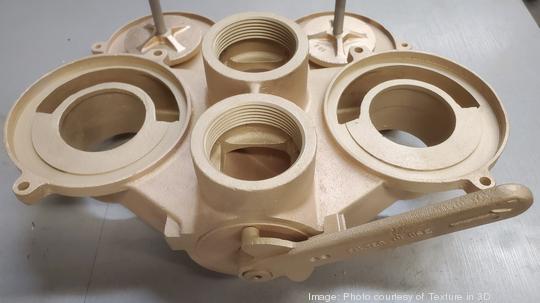
Peter Lynch has been working in machine shops for more than 20 years. He started as a tool and die maker, where veterans taught him the industry as a real craft. As time progressed, technology disrupted traditional machine shop work with inventions like 3D metal printing and computer numerical control machining of drop-off parts.
But it was at this intersection—where classic, artisan machine work meets automation—that Lynch found his newest venture, Texture in 3D, a new type of shop that uses highly automated machinery to create, frame and shape products based on the elements of art.
Services offered by Texture in 3D include abrasive blasting, glass bead blasting, wet blasting, surface preparation, texture development, polishing, surface modification and much more.
“If you had an iPad, we might do the texture and look of the gray matte finish on the back of it,” Lynch told Rhode Island Inno. “Our goal is to design a customer’s product so it can feel a certain way or be distinguished in the marketplace, so maybe it would have a gritty finish or maybe some dimples on it.”
Lynch said Texture in 3D’s main focus is in the medical field. A lot of medical machinery can come out really shiny, which can distract dentists or surgeons with the reflection. Texture in 3D uses sand blasting or glass bead blasting to put a matte finish on it and eliminate the shiny reflection.
Other medical customers may want to make pieces of equipment smoother, in which case Texture in 3D could use high-speed polishing. The company can work on any type of medical device that requires some kind of specialized surface finish, Lynch said.
While Lynch said the company can help a variety of customers, he is really looking for those that may need help on the research and development process.
“We consider it more artistic,” said Lynch. “It’s more than a sandblasting shop. There is lots of thought that goes into it. We are looking more for customers that have something fancy that they really want to stand out, where it's like, ‘Whoa, that looks really finished and amazing.’”
That’s one of the reasons Lynch will also work with startups or smaller companies trying to launch products. Texture in 3D can help product developers solve problems they might be having with the aesthetics or functionality of a new product.
The company truly has a lot of range. Not only can it create desired surface profiles, but Lynch said his team can also act almost like quality control by pre-inspecting parts that come in, assembling them, and then shipping them to the next place they need to go in the supply chain.
Lynch launched Texture in 3D in February, taking 9,000 square feet of space in an old mill building in Woonsocket.
The space includes a large blasting room with the ability to blast parts that are 20 feet by 20 feet by 20 feet, which is the type of space that Lynch says is hard to find in New England or the Northeast in general. The mill where Texture in 3D operates also has enough room to build more blasting rooms if there is the demand for it.
Despite launching on the eve of the coronavirus pandemic, and operating heavily in the medical industry, which has not been at full capacity, Lynch said business has been surviving.
Current customers include the Cambridge, Massachusetts company Inkbit, which makes 3D printers that use artificial intelligence, and Precision Coating, a medical anodizing company for medical equipment that is also located in Woonsocket. Customers Lynch would like to pursue include Hexagon AB, Thermo Fisher Scientific and General Dynamics Electric Boats.
Ultimately, Lynch thinks the type of work Texture in 3D is doing will continue to generate demand, and potentially even grow into a new specialty subsector.
“We are basically taking very old fashioned methods and applying them with automation to do something cool,” he said. “I see with the new technology that this old world stuff pairs with it, and I believe it's going to grow.”
Bram Berkowitz is a contributing writer for Rhode Island Inno.



